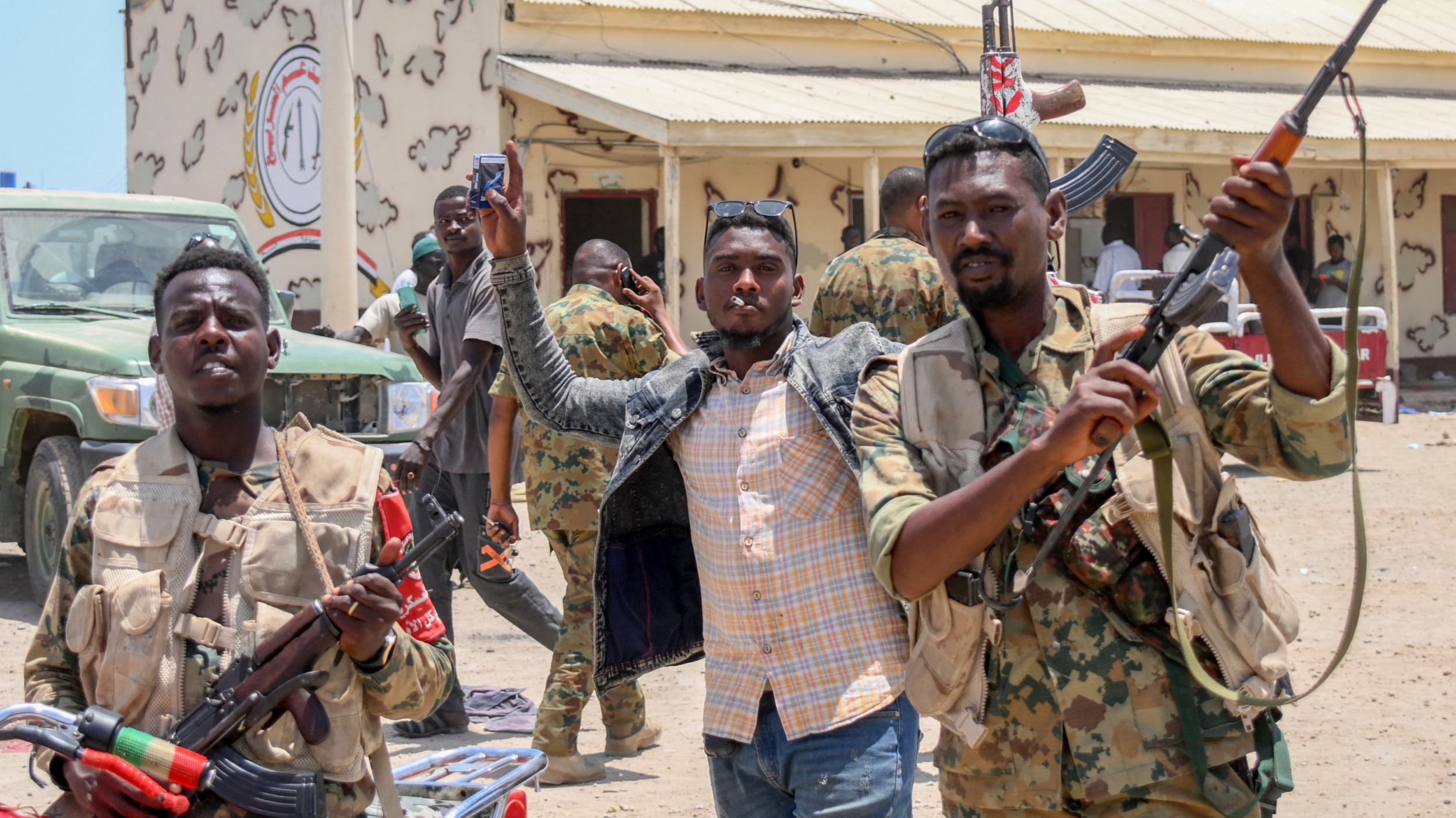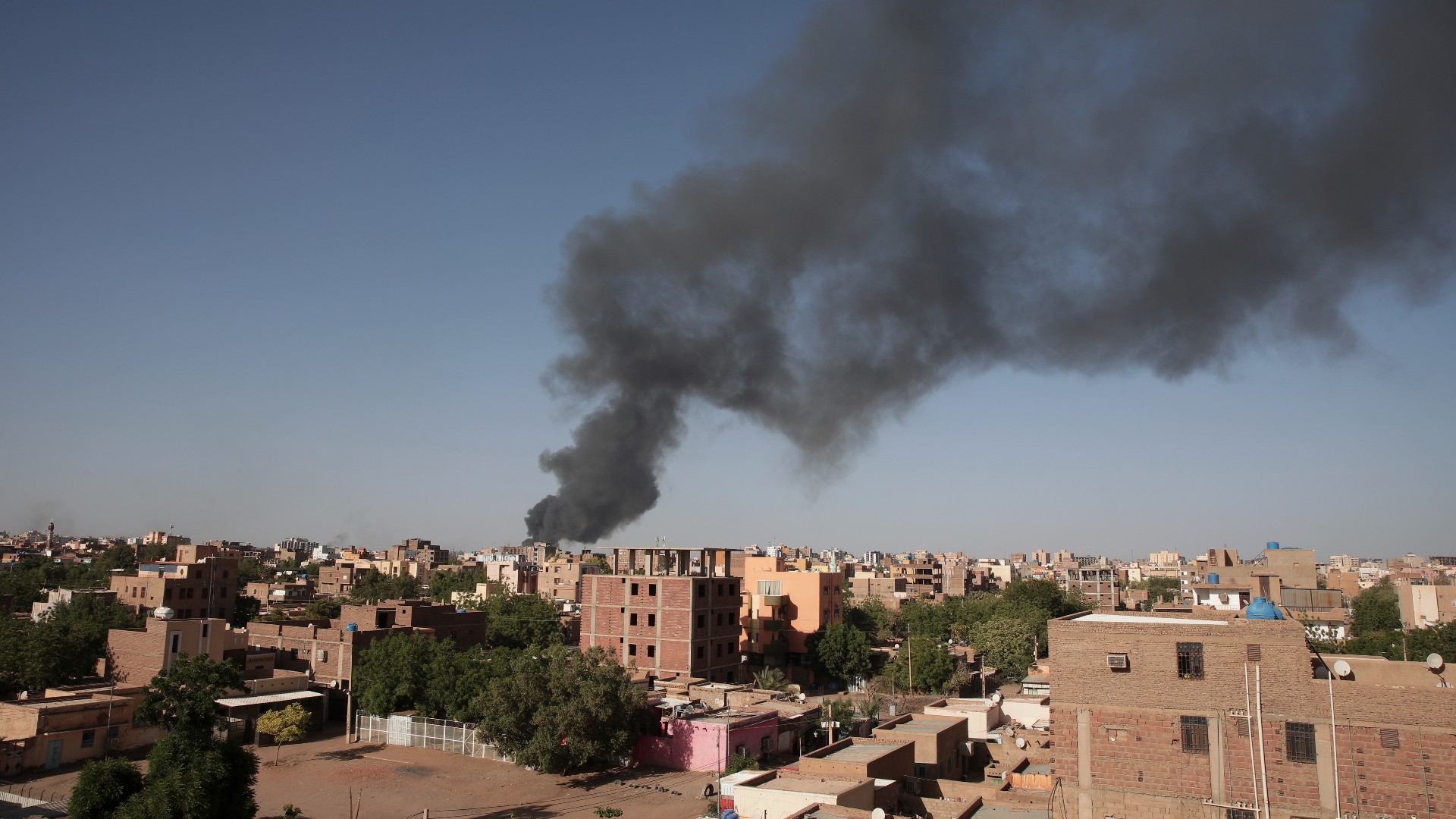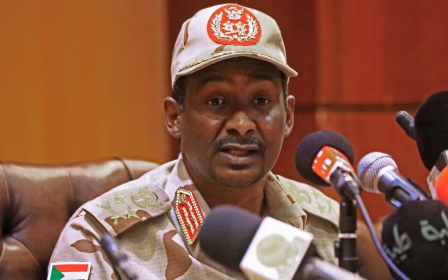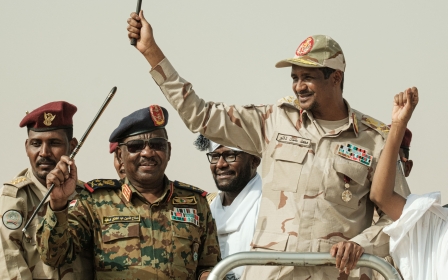Sudan turmoil: Corpses rot in corridors as hospitals shut down by fighting

Only a handful of hospitals in Khartoum are still operational on the fifth day of bloody battles between the Sudanese Armed Forces (SAF) and the Rapid Support Forces (RSF) paramilitary, and they can barely cope.
Nuha Mahjoub, a nurse at Khartoum Hospital, described to Middle East Eye terrifying scenes: hospitals on fire, ambulances unable to reach the wounded, and rotting corpses.
For three days, the medical staff at Khartoum Hospital were trapped inside by the fighting, until eventually 30 patients, doctors and nurses were evacuated to other hospitals.
"We try to be outside the house, in the garden, and not stay inside the rooms for fear of being bombed," Mahjoub told MEE from her home.
She said the capital resembled a war zone.
New MEE newsletter: Jerusalem Dispatch
Sign up to get the latest insights and analysis on Israel-Palestine, alongside Turkey Unpacked and other MEE newsletters
She told MEE that some dead bodies in Sudanese hospitals had bloated due to the lack of operational morgues and electricity. Per Islamic tradition, bodies should be buried as quickly as possible.
Mahjoub said that al-Shaab Teaching Hospital, where she had previously worked, was targeted directly with bombs.
"The ward of chest pain and heart disease patients was targeted. The hospital was evacuated and some patients were injured," she said.
"We don't know why hospitals are being targeted. Some are close to the headquarters of the armed forces, like Khartoum Hospital, which was caught up in the middle of fighting."
Since Saturday, the army and RSF have fought tooth and nail over strategic bridges, airports, military bases, and government offices.
The Sudanese health ministry estimates more than 270 people have been killed in the violence and another 2,600 wounded - despite a promised ceasefire on Wednesday that disintegrated as soon as it was called.
'We can't send ambulances to treat these patients as the situation on the streets is very dangerous'
- Nuha Mahjoub, nurse
Mahjoub said beyond those killed in the fighting, people who need oxygen or are at home and require urgent care for heart problems or kidney dialysis are becoming victims of the conflict.
"We can't send ambulances to treat these patients as the situation on the streets is very dangerous. People are dying in their homes for lack of medical care. We used ambulances as vehicles only - without medical staff - to transport and evacuate patients to other hospitals," she said.
Patients evacuated to other hospitals, like in Omdurman across the White Nile, are soon finding those facilities put out of action and are forced to relocate once again.
According to the Central Committee of Sudan's Doctors (CCSD), 39 of Khartoum's 59 hospitals stopped fully operating as of Tuesday evening. Sixteen of them were forced to evacuate and went out of service, while nine hospitals were bombed.
CCSD said that only 20 hospitals are left operating in complete or partial capacity, and some of them provide first aid only. With the security situation deteriorating, these hospitals are at risk of going out of service and the health sector collapsing altogether.
CCSD also said the military attacked five ambulances, and others were not allowed to pass to transport patients and deliver aid in areas of Khartoum.
Fighting in Omdurman
With fighting ongoing in the capital, many of Khartoum's residents have attempted to flee to safer areas of the country.
Ibrahim Douma fled to Omdurman on Monday, but violence was not far behind there as well.
Douma, who works with an NGO monitoring and documenting human rights violations, told MEE he could hear the sounds of bombs, shells and gunfire erupting close to the Mohandiseen neighbourhood in Omdurman's southwest.
The area is of high strategic importance, as it houses high-ranking officers and their families. In addition, it hosts the bases of the medical, engineering, signal and rocket-launcher units, and the Higher Military Academy.
Up to the north of the western bank of the White Nile lies the military hospital and government offices.
Douma said that he passed five checkpoints manned by army officers on his way to Omdurman. He was asked where he came from and where he was going.
"I saw tanks and military vehicles of the Rapid Support Forces burned on the side... the army did not allow us into Omdurman from the main road and we had to take a detour," he said.
The one-way White Nile bridge, which connects the north of Khartoum to the south of Omdurman, was partly closed, likely because military bases loom on the western bank of the White Nile.
For months, tensions between the armed forces, led by General Abdel Fattah al-Burhan, and the RSF, led by General Mohamed Hamdan Dagalo, have threatened to break out in open conflict.
Burhan and Dagalo, also known as Hemeti, led a coup against Sudan's pro-democracy civilian government in 2021. But rows over a political transition roadmap agreement that would fold the RSF into the army pitted them against each other and sparked violence over the weekend.
Douma said he was shocked when he heard about the news of the fighting on Saturday. He woke up to relentless phone calls from his family. In Khartoum, he lives a few kilometres away from the armed forces headquarters and the presidential palace.
"I drove a friend to Khartoum airport on Saturday morning and came back home around 6:30am. I drove on the armed forces bridge, and Bahri bridge which is close to the army and RSF areas, and everything was calm," Douma said.
However, at 9:30am he woke up to face a city at war. Shops were shut down, and soon electricity and tap water supplies were cut.
"It took me a few hours to absorb the shock. I could not believe it. I was not prepared for this war and we were anxious that the internet and communications would be cut as well," he said.
"We were fasting and we hoped this would end in a few hours. We had high hopes that the army and the RSF would pave the way to transition to a civilian government - but these hopes are shattered now."
Middle East Eye delivers independent and unrivalled coverage and analysis of the Middle East, North Africa and beyond. To learn more about republishing this content and the associated fees, please fill out this form. More about MEE can be found here.





